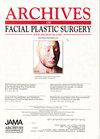Effects of copper tripeptide on the growth and expression of growth factors by normal and irradiated fibroblasts.
Abstract
Objective: To evaluate the effects of copper tripeptide (GHK-Cu) on the growth and autocrine production of basic fibroblast growth factor, transforming growth factor beta1, and vascular endothelial growth factor by normal and irradiated fibroblasts in a serum-free in vitro environment.
Methods: Primary human dermal fibroblast cell lines were established after explantation from intraoperative specimens obtained from patients who had undergone radiation therapy for head and neck cancer. Normal and irradiated fibroblasts were propagated in serum- and growth factor-free media. Treatment groups were exposed to GHK-Cu (1 x 10(-9) mol/L). We measured cell counts and production of basic fibroblast growth factor, transforming growth factor beta1, and vascular endothelial growth factor.
Results: Irradiated fibroblasts survived and replicated in serum-free media. The population-doubling times of normal and irradiated fibroblasts exposed to GHK-Cu were faster than those of nontreated controls. Irradiated fibroblasts treated with GHK-Cu doubled at a rate that approximated that of untreated controls, and produced significantly more basic fibroblast growth factor and vascular endothelial growth factor than untreated controls early after GHK-Cu exposure.
Conclusions: Irradiated fibroblasts survive and replicate in serum-free media, establishing this model as ideal for evaluating growth factor production in vitro. Copper tripeptide accelerates the growth of normal and irradiated fibroblasts to the point where treated irradiated fibroblasts approximate the population-doubling time of normal controls. An early increase in basic fibroblast growth factor and vascular endothelial growth factor production by GHK-Cu-treated irradiated fibroblasts may improve wound healing.





